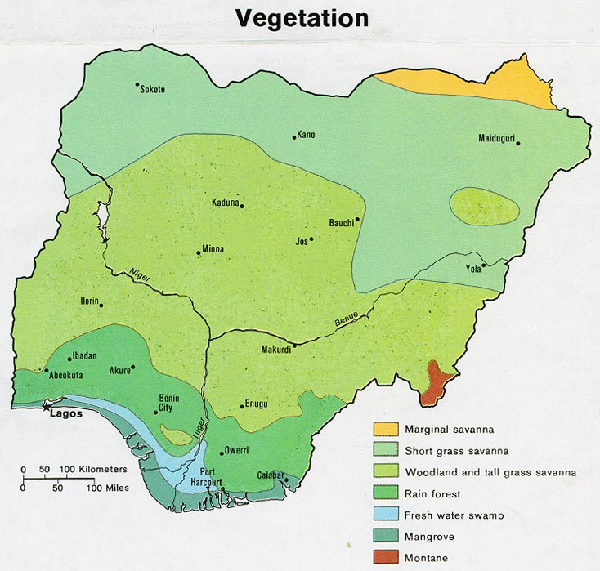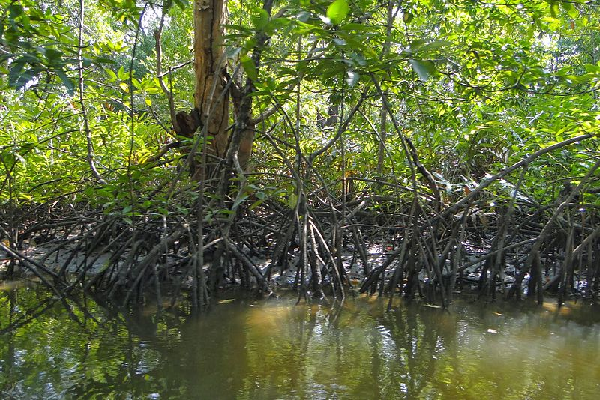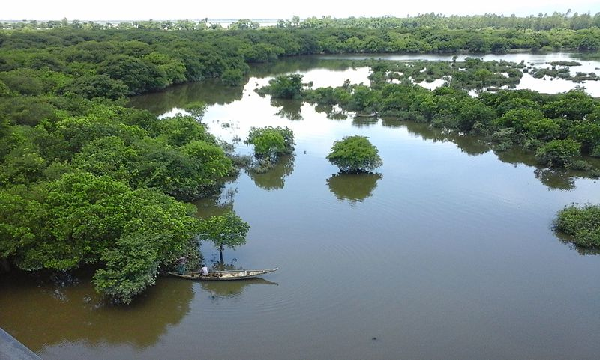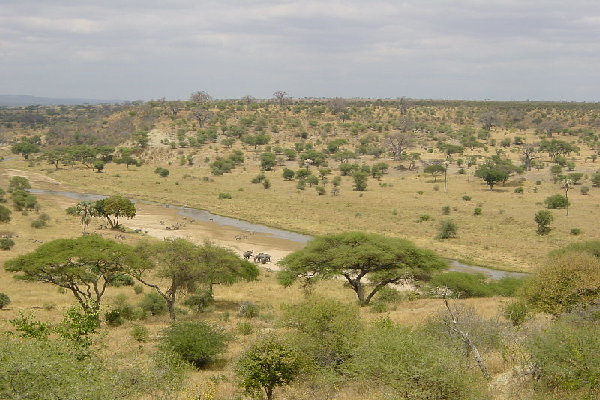This post intends to serve as a build-up to the first ever meet-up of STEMng writers/authors/readers and enthusiasts on the steemit blockchain which has been slated to take place at Lekki Conservation Center, Lagos Nigeria on Wednesday, 11th of July, 2018. A blog about the meet-up has been published here by the stemng account on steemit.
The entity called 'Nigeria'
Nigeria, popularly referred to as 'the giant of Africa' is a country located in the Western side of the African continent, South of Sahara, longitudes 30E and 150E and latitudes 40N and 140N respectively. It is bothered in the Western side by Republic of Benin, by Chad and Cameroon in the Eastern side, by Niger republic in the Northern side and the Coast of Gulf of Guinea in the South.
One would think being 'Giant of Africa' means Nigeria has the largest landmass in the continent but this is far from being so. The country actually ranks 14th in Africa with a total landmass of 923,768 km2. The country was nomenclatured as a result of her strong economy coupled with her relative large human population density. Currently, the country is the most populous African country with close to 200 million individuals. The total water area of the country stands around 13,000 km2.
Vegetation/Plant diversity in Nigeria
For those that might be wondering, biodiversity generally refers to the varieties of plant and animal life found in a particular place which tend to play significant role in the well-being and overall existence of man and his environment.
There is absolutely no doubt that Nigeria is blessed with abundant plant and animal diversity. This is in part due to the complex topography as well as wide variety of habitats that serve to house a lot of plant and animal species. Starting from the Southern part of the country and moving up North, the vegetation varies greatly. The country lies within the tropical zones and characterized by tropical climate.
There are two major vegetation zones within the country, these include;
- The forest vegetation zones
- The savannah vegetation zones
The forest vegetation has been defined in a variety of ways but to a layman, it is simply a vegetation dominated by trees with more or less touching crowns and little or no grass or herbaceous ground cover. On the other hand, savannah vegetations are those characterized by short, well spersed woody species with sufficient grass covers.
Other minor vegetation zones include the ones around montane area such as found in Obudu cattle ranch and gallery forests.

The forest vegetation also varies with water and soil type being the major determinants for the variation. Hence, the vegetation of the down South is characterized mainly by Mangrove and freshwater Swamp forests. The mangrove swamp forest extend around the coastal region of the Niger Delta and is composed majorly of mangrove species such as the red and white mangrove plants; Rhizophora racemosa, R. harrisonii, R. mangle and plants species majorly in the Combretaceae and Avicenniaceae family. All the plant species that grow in this zone are both water and salt tolerant.
The Niger Delta region has been touted as one of the world's biodiversity hotspots with critical ecological roles such as preservation of seascape biodiversity, housing some important animal species as well as functioning as a carbon emmision sinks. However, the region is greatly threatened by oil mining activities of some multinational oil companies around the area.

Moving a bit further up the vegetation belt, the zone is characterized by freshwater swamp forest. The swamp formed majorly around lakes and rivers with fluctuation in the water level of the swamp brought about by the seasonality of the rain/precipitation. Perhaps I forgot to indicate that the climate of the country is characterized by two distinct seasons - the rainy season and the dry season. During the rainy season, the water level in the freshwater swamps rises and falls during the dry season. Hence, only water tolerant and salt intolerant plant species grow in this zone.
The most common plant species that is characteristic of this zone is the raffia palms (Raphia species) which is also usually cultivated around the region due to its economic benefits. Other species of plants common to the zone include Alstonia spp., Cleistophollis patens, Lophira alata and Lonchocarpus griffonianus. Species of plants like Nymphaea lotus, Pistia striatiotes and Vosia cuspidata are usually found floating on various water bodies found around the region.

Next in line from South towards North of Nigeria is the tropical rainforest vegetation zone. This zone is charcterized by well drained soils with different layers of vegetation cover. The first layer is made up of tall trees which are mostly of economic importance, usually up to about 40 m in height and generally referred to as the emergent layer. The next layer is composed of shorter tree species with more less touching crowns which serve as a canopy and most times prevent sunlight from reaching the forest's floor. The common tree species found in this region include Ceiba pentadra, Terminalia species, Triplochyton scleroxylon, Picnanthus angolensis, Gmelina arborea, Adansonia digitata, Bombax buonoposense, Milicia excelsa and a host of other economically important timber species.

Below the first two layers of the tropical rainforest is an understorey layers of short trees, about 5-10 m in height and usually flanked by woody climbers and epiphytic plant species. Most rainforest vegetations usually lack a ground cover of herbs and grassses, except in few cases.
Further upnorth Nigeria are series of savannah vegetations in form of derived savannah, guinea savannah (northern and southern), sudan savannah and sahel savannah which happens to be the characteristic vegetation in the extreme Northern part of the country. The savannahs differ in the amount of rainfall received and amount of grass cover present in the vegetation. Variations also exist in terms of species composition, richness and diversity. Sahel savannah happens to be the dryest of the savannahs.

Animal diversity
Nigeria is not only culturally diverse but also have a wide varieties of plants and animal species to complement its diversity. The country has several indigenous species of animals as well exotic species. The different vegetation zones provide a wide varieties of habitats for animals of different levels of biological complexity to thrive. The mangrove swamp, the freshwater swamp and the tropical rainforest vegetation are home to many reptiles, other aquatic organisms as well as several terestrial vertebrates and invertebrates.

Plant and flesh eating species of animals dominates the savannah grasslands of the country, although some of these animals have either gone into extinction or already facing the prospect of it. Animals species such as elephants, warthogs, chivets, jackals, wild dogs and those of cat's family such as lions, cheetahs, leopards etc. have been recorded in these vegetation zones. Water dwelling mammals such as hippopotamus and crocodiles have also been recorded in parts of these vegetations, especially in areas where rivers run through the grasslands.
Overall, the country has been opined to have approximately two hundred and ninety (290) species of mammals and about nine hundred and fourty (940) species of birds along with inumerable species of other classes of animals.
The challenge within and ahead
Just as it is a worldwide problem, biodiversity conservation and sustainable use of natural resources is suffering a great deal in the country. The Nigerian forest cover has been significantly reduced due to human activities such as overlogging, selective logging, agricultural activities, hunting, burning, conversion to non-forested use and a host of other activities. These reduction in forest cover has led to loss of wide varieties of habitats that serve to house important animal species.
Overall, both plant and animal diversity has been reduced greatly by direct or indirect human activities. According the report of International Union of Conservation of Nature, Nigeria has about 309 plant and animal species on the red list, that is the list of endangered species. About 26 species of mammal, 19 species of bird, 8 species of reptiles, 13 amphibians, 60 species of fishes, 15 Invertebrates and a whooping sum of 168 species of plants have been enlisted as been on the verge of extinction.
A host of factors have been identified as being responsible for the trend being witnessed in the area of biodiversity richness. These include high rate of population growth, poverty, constraints in policy and legislation formulation, poor or inadequate land use planning,socio-cultural issues and of course, the well publicised effects of climate change.
The efforts so far
A lot of efforts have been and still being put in place to stem the tide the threats to our biodiversity. Some of the efforts include establisment of protected forest areas, establishment of national parks, formulation of policies guiding land use, re-afforestation and a host of others. The result of few of the efforts is the establishment of Lekki Conservation Center under the auspices of Nigerian Conservation Foundation in Lekki, Lagos. That happens to be the venue of the meet-up of STEMng community come the slated date.
Thank you all for reading.
References
Convenient Delegation Links:


Oseni Shaid | Ambassador (Nigeria)
Email : [email protected]
Join a community with heart based giving at its core








The land is green, we love it that way. It is our heritage and even with the present pummeling the environment is receiving/had received, we still have lots of lush vegetation. I'm happy to be part of steemstem and stemng, we are making history. The revolution is definitely going to be televised :)
The land is green indeed. A lot needs to be done to replenish/conserve the greenness. The steemit blockchain is a revolution on its own, steemstem/stemng happens to be a major fuel driving the revolution. The temperature is just about rising....
I'm more than a proud Nigerian. We are richly blessed in all dimensions.
Being a member of the stemng community has again assured me of the presence of great minds and knowledgeable....and so far so good, I can only say that we have a bright future..I can't to finally meet everyone
NIgerian heritage is quite rich. A lot of brilliant minds as well as numerous resources. Let's continue building our community here. A little thing can trigger the revolution that we all want.
This post has been voted on by the steemstem curation team and voting trail.
There is more to SteemSTEM than just writing posts, check here for some more tips on being a community member. You can also join our discord here to get to know the rest of the community!
Nigeria is blessed and I'm very proud to be a Nigeria. I'm also proud to be a member of STEMng. We're going places.
We are sure going places. Thanks for being part of this great community
This post is reminiscent of my geography days in secondary school. Thank you for putting all of these together.
I'm glad I could take you back in time. Thanks for coming around
Naija is blessed and endowed with nature's finest - in vegetation, landscape, ethnicity, and all whatnot. Even the colour "green" in our flag is a depiction of our rich vegetation.
I'm always proud to be a Naija. God bless Nigeria
God bless Nigerians as well. We are indeed blessed in terms of human and natural resources.
Nigeria is truly a blessed country. Only few countries in the world have what God deposited in Nigeria. Thanks aplenty @gentleshaid for this all important post and for taking your time to make this super wonderful post.
God bless Nigeria.
God Bless You!
Congratulations @gentleshaid! You have completed the following achievement on Steemit and have been rewarded with new badge(s) :
Click on the badge to view your Board of Honor.
If you no longer want to receive notifications, reply to this comment with the word
STOPDo not miss the last post from @steemitboard:
SteemitBoard World Cup Contest - Semi Finals - Day 1
Participate in the SteemitBoard World Cup Contest!
Collect World Cup badges and win free SBD
Support the Gold Sponsors of the contest: @good-karma and @lukestokes
Well done on your steemng meetup! It takes some organization to prepare something like this.
Glad to see that the Steem participation extends beyond the virtual work!
Thanks. My sincere apologies that this response is coming rather extremely late. However, I believe it is better late than never. I am sure you must have seen some images about the meet up?
I love Nigeria, my Nation my pride.
Nigeria is green and rich in culture and agriculture, mineral and to name a few.
It will one day take it rightful place once again.
I saw the pics of the meet up, missing lasgidi badly. Exams shaaaaa, I pray to see you all some day through another meet-up.
Thanks for the article. I enjoyed it greatly. Are you in contact with the Nigerian Diaspora located in high-tech countries? #swizterland #resteemed
Posted using Partiko iOS
When I compare Nigeria to my country I feel it's over populated here and I often miss to be outside of town. Here in the northern part of Germany there is not much forrest left.
I see that you deeply care for nature and sometimes I feel desperate due to the fact that human kind has such a big impact on animal and plant life.
I feel of being of not much use as I am not an active environmentalist ... only writing on the blockchain sometimes even makes it worth ...
In the recent ten years or so I reduced my lifestyle to the max, so to speak. I decided against traveling by aircraft and put consumption to the most possible minimum. I do not need much to feel happy with what I have.
My attempt to protect environment relate to the human mentality, in which I express my will to use as few material things as possible to compensate through my concept of life.
We need a reduction in both demand and supply. In fact, the biggest hurdles are probably those of mobility and energy consumption. Just like a smarter and wiser use of agricultural land. Water retention basins in agriculture combined with a permaculture economy have long been proven to be more effective than conventional agriculture, but it takes a lot of time and patience to turn the findings into reality. For example, if we had terraced fields instead of flat ones, it would have been a start. Water management is becoming increasingly important. This summer's farmers are suffering from a lack of rain and water catchment basins would probably not have made the harvest so badly damaged.
... Society is like a dinosaur. Actually people have the right things in mind and good ideas protecting nature and developing an ethical mindset but it takes a long time to move the heavy beast ...